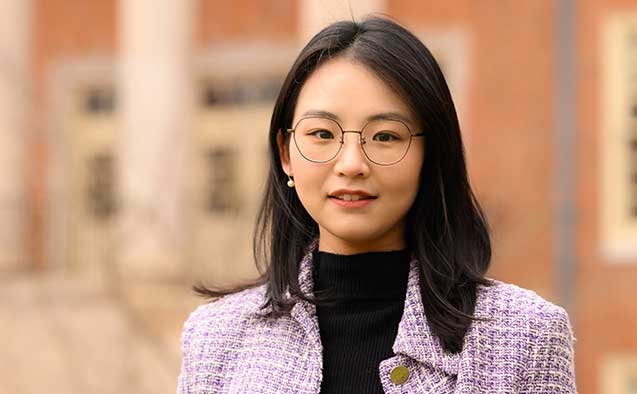Computer scientist wins NSF CAREER Award to advance Alzheimer's research using AI

In her groundbreaking work as a computer scientist, assistant professor Minghan Chen is using artificial intelligence to create new techniques to better understand the mechanisms behind Alzheimer’s disease and predict its progression across brain networks.
Chen was recently awarded a five-year, $500,000 National Science Foundation CAREER Award for her research project entitled: “Towards a Living Neuron Twin for Improving Human Cognitive Health”.
How it will work
“My NSF research project will work by developing a holistic computational framework called Neuron Twin,” said Chen. “This pioneering framework will combine two powerful algorithmic approaches – multiscale modeling and deep learning.”
Her research will help facilitate the analysis and comprehension of complex medical and health data and will help medical researchers address emerging questions in health data science.
“Chen’s work proposes techniques that will help overcome limitations of other contemporary work in this area, including techniques for the integration of diverse types of data, handling of small data sets, and building of interpretable models,” said William Turkett, associate professor and chair of the computer science department. “The findings of her work are expected to be highly valuable – facilitating the development of treatment strategies and personalized medicine for Alzheimer’s disease.”
Why Chen’s research is important
Alzheimer’s disease is a fatal and devastating cognitive disorder that affects millions of people worldwide. Currently, there is no effective treatment.
“By developing a better understanding of the disease’s mechanisms, we can improve early diagnosis and treatment, ultimately improving the quality of life for patients and their families,” Chen said. “Such a framework can be transferred for use in broader applications of neurodegenerative diseases, including but not limited to Parkinson’s disease and Lewy body dementia that share similar disease pathogenesis and therapeutic challenges.”
For Chen, the NSF CAREER Award is more than an opportunity to grow in her field. She was inspired to pursue this project by her passion for applying computer science to solve real-world health challenges.
“As a child, I was always interested in how things work, which naturally led me to computer science,” Chen said. “My interest in healthcare applications was further fueled by my parents, who are doctors. Witnessing people struggling with incurable illnesses like cancer and brain diseases made me realize the profound impact technology can have on advancing healthcare and alleviating societal burdens.”
Impact that extends beyond her research
In addition to the research, there is also an outreach component to the CAREER award. Wake Forest undergraduate and graduate students will work with Chen on the project. Workshops, seminars, and other educational activities both on campus and in the local community are also being planned.
Chen is developing a new interdisciplinary course on modeling and learning for Wake Forest students as well as a summer boot-camp on those topics open to students at other universities.
She has curated strategic partnerships for her work. Collaborating institutions include the Alzheimer’s Disease Research Center, which will help disseminate and apply her findings in the clinical setting, and the UNC-Chapel Hill Advanced Medicine Laboratory.
“Winning an NSF CAREER Award is more than just an achievement for me; it’s a significant encouragement and support,” said Chen. “As a female researcher, it recognizes the impact and potential of my work, which is particularly meaningful in a field where women are underrepresented. This recent award provides me with the resources and support to further advance my research, enabling me to make a more substantial contribution across the fields of computer science and medical and health science.”
Chen is one of six WFU winners of NSF CAREER Awards announced within the past year. This includes faculty members from the physics, chemistry, math and statistics and engineering departments.
Categories: Top Stories
Wake Forest News
336.758.5237
media@wfu.edu
Meet the News Team
Headlines
Wake Forest in the News
Wake Forest regularly appears in media outlets around the world.




